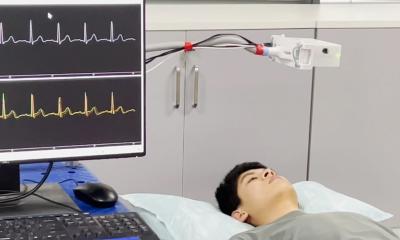Disappointing HTN-3 trial results challenge future of procedure
It was the quiet before the storm. At the end of March, during the American College of Cardiology (ACC) meeting in Washington, the future of renal denervation was about to be decided with the presentation of the Medtronic-funded Simplicity HTN-3 clinical trial.

Over the past two years an industry-led bandwagon for renal denervation has been rolling across European and American cardiology meetings promising that resistant hypertension – hard-to-control high BP – can be effectively treated with a mechanical intervention to ablate nerve endings in the renal artery, as an alternative to the billions of dollars spent each year on pharmaceutical remedies.
It all came to a screeching halt with the announcement by Medtronic (Minneapolis) in January 2014 that its pivotal United States trial failed to meet the primary endpoint for efficacy. ‘It is still early days,’ said Dr Jim Reekers, in his presentation during the ECR session ‘Renal artery denervation in the management of resistant hypertension’.
‘It is a promising technique, it is a safe technique,’ he added. ‘We know from the pathophysiology that it should work. We have evidence, but not too much. We have contradictory evidence now from what appears to be a pretty good trial. For the moment, we are in troubled waters,’ he explained, updating the scattered participants.
Professor of interventional radiology at the University of Amsterdam and former president of the Cardiovascular and Interventional Radiological Society of Europe (CIRSE), Reekers joined with fellow presenters in assessing the fallout from the Medtronic announcement.
Asked what they will be seeking in the HTN-3 results, he replied: ‘As a scientist, I will be looking for a critical appraisal of the trial. If it measures up to those standards, I think we are done.
‘I know industry will be looking for something else, trying to shoot holes in this trial,’ he said.
Could the company that paid for the HTN-3 study attempt to destroy its own study? Reekers: ‘Yes. That is essentially it. Medtronic has been responsible in bringing out the press release – and it’s important to remember that even Medtronic does not know the real causes of missing the efficacy end point, has no idea of what the data are because it is truly an independent trial.’
Marc Sapoval, is a professor of Clinical Radiology and Chairman of Cardio-Vascular Radiology at the Hôpital Européen Georges Pompidou (Paris). He is also the lead investigator for the DENER-HTN Renal Denervation in Hypertension study of 120 patients over 36 months that will be published in June 2014. The trial included a randomised arm for bilateral renal denervation using Medtronic's Symplicity catheter.
‘I have no special information [about HTN-3] but I believe there will be negative results from the way it will be analysed,’ he replied. ‘I suspect in the sham control arm the patients probably took their drugs and their level of blood pressure decreased more than was expected. I also believe that technology matters, so perhaps some other devices will be more effective. As I showed in my presentation the depths of the renal nerves require a penetration depth of up to six millimetres, so that, if ablation was only two millimetres, it may not have been effective enough.
‘This is only one trial, it will not close the topic.’ he continued. ‘Yet this is a very high-risk field for companies. We saw the example of Covidien, which was very deeply involved. They simply shut down all their work because of investment issues. They expected that, with positive HTN-3 results, they could just follow behind and win FDA approval for their device in two years. Now the return on investment is not there any more because the FDA is not ready to accept these devices.’
Gerard Goh, an Interventional and Diagnostic Radiologist at St George's Hospital in London, has presented a sweeping review of approved and proposed devices for renal denervation. ‘There are a lot of unanswered questions about the HTN-3 trial design,’ he pointed out.
So what did the results presented at the ACC show? Resistant hypertension patients taking at least three drugs (including a diuretic) to control their BP had participated in the carefully controlled, Medtronic-funded but independent Simplicity BTN-3 blinded trial. Unfortunately, the authors concluded that, six months after renal-artery denervation, compared with a sham control, the procedure had not shown a significant reduction in systolic BP.
Nonetheless, study leader Dr Deepak Bhatt, at the Harvard-affiliated Brigham and Women’s Hospital, said he remains cautiously optimistic about renal denervation, which remains an investigational procedure in the USA.
Gerard Goh also believes there may be a benefit to a negative result: ‘All other companies that have invested so much will now need to design their own trials accordingly and we are going to get a much better idea of renal denervation as a whole.’
Jim Reekers added: ‘Now that the field of renal denervation is open, whatever the level of evidence that is available at this moment, there will be a solution. The market has been opened and we have not seen the last of the innovation and ingenuity people are exploring.’
30.04.2014











